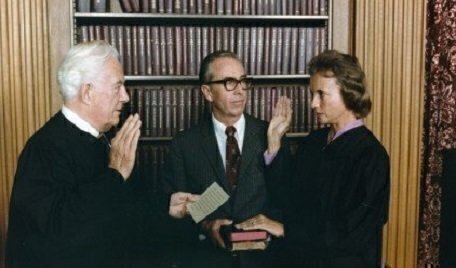With praise from Chief Justice John G. Roberts, Jr., as a “towering figure in the history of the United States and indeed the world,” retired Supreme Court Justice Sandra Day O’Connor disclosed on Tuesday that she has been diagnosed with dementia and that it is forcing her to withdraw from public activities.
 The first woman to serve on the Court, becoming a Justice in 1981, the 88-year-old Arizonan has continued to promote civic involvement – especially among young people – in the 12 years since she retired from the bench.
The first woman to serve on the Court, becoming a Justice in 1981, the 88-year-old Arizonan has continued to promote civic involvement – especially among young people – in the 12 years since she retired from the bench.
In a statement addressed to “friends and fellow Americans,” O’Connor wrote of “how vital it is for all citizens to understand our Constitution and unique system of government, and participate actively in their communities.” She noted that, eight years ago, she created a program – called iCivics – “to teach the core principles of civics to middle and high school students with free online games and curriculum that make learning relevant and remarkably effective. Today, she said, that program “reaches half the youth of our country.” (The National Constitution Center, the publisher of this blog, has worked with the iCivics program. Justice O’Connor remains a Trustee Emeritus of the Center.)
Her statement, released by the Supreme Court along with a statement by the Chief Justice, was described by her as a response to inquiries made recently by “many people” about her current status and activities.
“Some time ago,” she wrote, “doctors diagnosed me with the beginning stages of dementia, probably Alzeimer’s disease. As this condition has progressed, I am no longer able to participate in public life.” She added that she decided to “be open about these changes, and while I am still able, share some personal thoughts.”
Not long after her retirement from the Court in 2006 after more than 24 years as a Justice, she recalled, “I made a commitment to myself, my family, and my country that I would use whatever years I had left to advance civil learning and engagement.”
Although her place in history has always been assured because she became the first woman ever to join the Court (nominated by President Ronald Reagan), her most enduring legacy was the role she played for years as the “swing” Justice. In the modern Court, which is frequently divided deeply, O’Connor with considerable frequency would cast the deciding vote that often placed her midway between the two philosophical blocs of Justices.
It was a centrist role that she had inherited from the late Justice Lewis F. Powell, Jr., and it was a role that she passed on to Justice Anthony M. Kennedy after she had retired. Justice Kennedy just retired from the Court at the end of July, and has since been replaced by Justice Brett M. Kavanaugh.
Chief Justice Roberts, who may be the next Justice to act – at least some of the time – as the “swing” Justice, issued a statement on Tuesday expressing sadness at the news of her illness, but adding that he was “not at all surprised that she used the occasion of sharing that fact to think of our country first, and to urge an increased commitment to civics education, a cause to which she devoted so much of her time and indomitable energy.”
O’Connor, who chose to retired from the Court in order to devote more time to caring for her husband John, who suffered from Alzheimer’s disease, said she would continue living in Phoenix. Recalling her youth as “a young cowgirl from the Arizona desert,” she wrote that “I never could have imagined that one day I would become the first woman justice on the U.S. Supreme Court.”
She called on others to take up and advance her cause of promoting learning about the Constitution and the American government.
Lyle Denniston has been writing about the Supreme Court since 1958. His work has appeared here since mid-2011.







